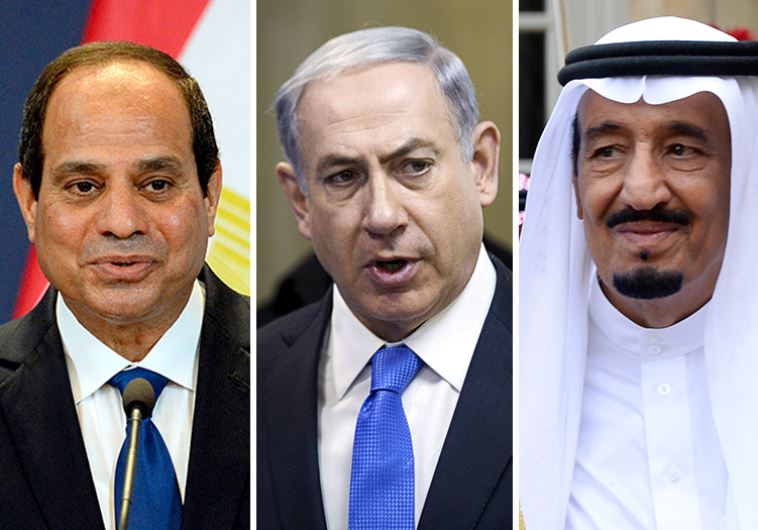Teaming up with Arab states for Israel’s security
Amnon Reshef/Ynetnews/Published:07.31.15/Israel Opinion
Op-ed: Combining intelligence abilities and coordinating preventive activity is the only way to restraint Iran, both in terms of nuclear deal violations and its further contribution to instability in the region.
Beyond the disagreements over the nuclear deal with Iran, one fact is indisputable: The agreement has been signed. Prime Minister Benjamin Netanyahu can fight to thwart it in the Congress, a futile battle, thereby deepening both the rift with the Obama administration and the damage to the Israeli deterrence, which is also fed by the image of the intimate relationship between the two countries.
On the other hand, he can choose a more creative outline which will contribute to our security. It’s time to change direction and turn over a new leaf with the administration in Washington, through tight cooperation in monitoring the agreement’s implementation by Iran, cooperating to thwart the Iranian subversion in the region, which will likely be stepped up, forming a security compensation package which matches the new reality and the challenges stemming from it, and coordinating diplomatic moves. All this requires us to rebuild the close relationship and restore the credibility and the past commitment for diplomatic-security cooperation.
The new geo-strategic situation, in which Iran grows stronger as a result of the sanctions’ removal, creates both a need and an opportunity for change. The Iranian ambitions from hegemony in the Middle East as a regional power, its expected military armament, the increase in the amount of weapons transferred to Hezbollah, Hamas and other terror groups, the constant threat to its neighbors in the Persian Gulf and the rhetoric of destroying Israel should all be countered with a political-security plan.
Israel, the pragmatic Arab states and the Western states have shared enemies and interests: Iran and the radical Islamic terror organizations. We even share the disappointment by the American policy in the Middle East. This infrastructure can be leveraged in favor of Israel’s security. Instead of getting dragged by the events, Israel should initiate a diplomatic move that would allow the “coalition of those concerned by Iran” to concentrate their security efforts. Combining intelligence abilities and coordinating preventive activity is the only way to guarantee that Iran will be restrained, both in terms of agreement violations and in its further contribution to the instability in the region.
For this purpose, Israel must launch a security-diplomatic initiative, while adopting the Saudi-Arab peace initiative as a basis for negotiations. This isn’t a “gospel truth.” The Arab states’ representatives have clarified more than once that accepting the initiative will allow a discussion on the Israeli reservations.
The moderate Arab states are also aware of the fact that the Middle East has changed in the 13 years that have passed since the Arab peace initiative was first introduced. It’s clear to everyone that the issue of the Golan Heights, for example, is not on the agenda. The demand to return to the 1967 lines has also changed. The Arab League’s monitoring committee has publicly expressed its willingness in principle to adopt the land swap plan.
The issue of the “right of return” isn’t even mentioned in the peace initiative. The wording is: “Attaining a just solution to the problem of Palestinian refugees to be agreed upon in accordance with the UN General Assembly Resolution No 194.” The statement that the solution will be “agreed upon” points to an Israeli veto on every solution which we find unacceptable. The Arab leaders have clarified that there is no precondition of reaching a full permanent agreement with the Palestinians before starting a gradual implementation of the initiative. The actual acceptance of the initiative – with the Israeli reservations – can open a new chapter in the regional dialogue.
The combination between a new chapter in our relationship with the administration in Washington and the international community and our willingness to discuss the Arab initiative will encourage and motivate the Obama administration to mediate between the sides. A combination of a local move alongside the suggested regional move will deepen the initiative’s contribution to Israel’s security even more.
In this context, it will be possible to calm down the situation in the Gaza Strip, before it catches fire again, by inviting our partners to the regional agreement – led by Egypt, Saudi Arabia and Jordan – to take part in the reconstruction of Gaza and the development of the West Bank, as part of agreements with the Palestinian Authority. Here too, tight coordination with Washington is a necessary condition for making progress.
**Major General (ret.) Amnon Reshef, the former commanding general of the IDF Armored Corps, is the founder and chairman of the Commanders for Israel’s Security movement.






















